Cosy new camps and unexpected wildlife sightings should draw you to Zambia’s North Luangwa National Park. A visit also provides a good alternative route from Mfuwe to Mpika. By Philip Briggs
One of the questions most frequently asked on Zambia travel forums is the best self-drive route between South Luangwa National Park and the T2 connecting Lusaka to Nakonde on the Tanzanian border.
It’s a good question. As the crow flies, the distance between Mfuwe (the gateway village to South Luangwa) and Mpika (the most convenient goal along the T2) is little more than 100km. Using surfaced roads, however, the most direct route between Mfuwe and Mpika is a daunting 1,300km slog along the T4 and T2 via Lusaka.
Traditionally, the most popular 4×4-only alternative to this Lusaka route entails driving north through South Luangwa to Chifungwe Gate. The route then climbs northwest up the escarpment to emerge on the surfaced T2 about 40km southwest of Mpika. This is a rough road at the best of times, and impassible during the rains.
In October 2021, we decided to take a different and slightly longer 4×4 route via Luambe and North Luangwa national parks. Our reasons for this were twofold. Firstly, we were keen to check out a trio of new amenities in North Luangwa by the Frankfurt Zoological Society (FZS). The society has established not only Ituba and Samala Camps, but also a freshly-cut game-viewing track called Chimana Loop. Secondly, we were told reliably that the escarpment ascent through North Luangwa had been upgraded earlier in 2021. This route was now in far better shape than its counterpart in South Luangwa.
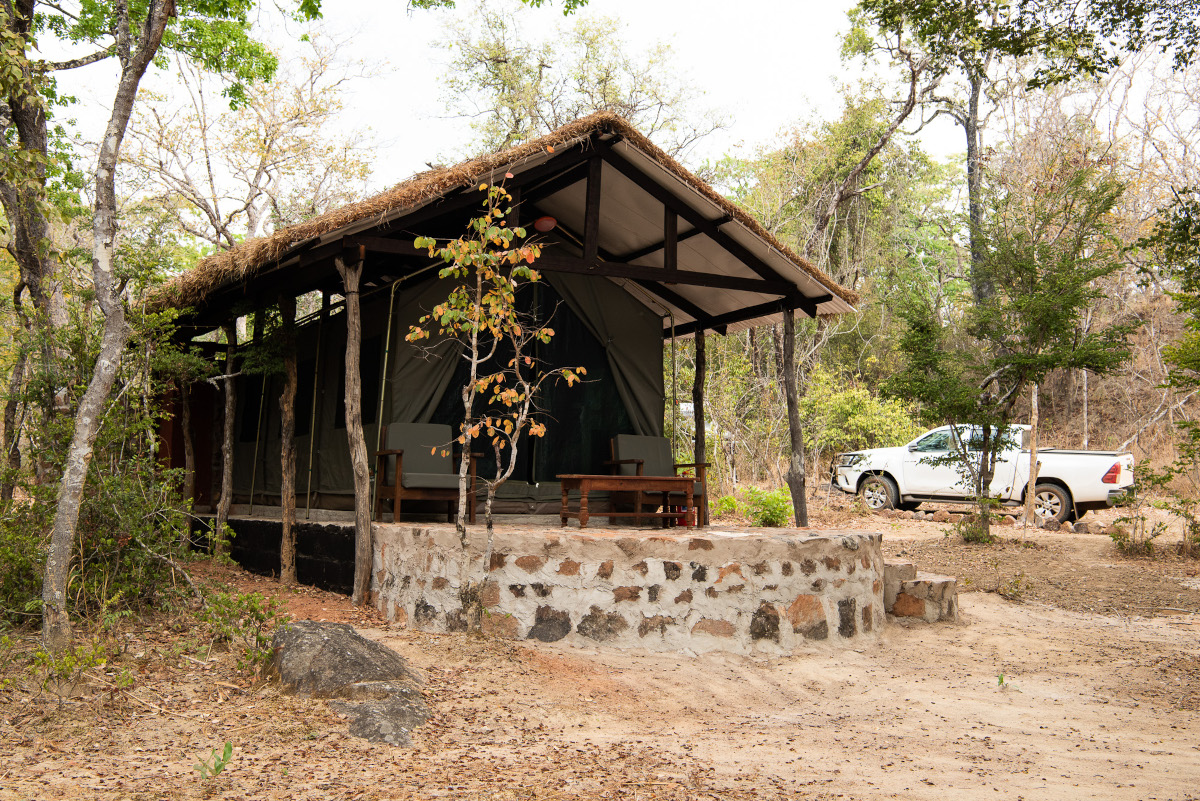
Stocking up in Mfuwe
Because no provisions are available along the route through North Luangwa, we stocked up in Mfuwe a day before we set off. The best source of frozen meat, packaged goods and wine here is the Mayana Supermarket. You can also find a fair range of goods at Shopleft near the Oasis Fuel Station. By the way, this is your last opportunity to top up the tank before Mpika. Opposite the fuel station, there’s a fresh produce market where you can stock up on basic veggies. Freshly baked rolls are on sale here too, from around 6am until they run out.
From Mfuwe to Ituba Camp
The 220km drive to Ituba Camp is on mostly adequate unsurfaced roads running roughly parallel to the east bank of the Luangwa River. But take note, sporadically it can be quite rough or sandy. We drove more or less non-stop and made it in under eight hours. However, conditions are changeable and one heavy rainstorm might alter the landscape. The drive involves a couple of sandy river crossings where 4×4 is essential. I imagine these might be impassible after rain. The last 20km before arriving at Ituba presents an unusual slalom-like challenge as the narrow road zigzags sharply between giant mopane trunks!
The route between Mfuwe and Ituba passes through the Nsefu Sector of South Luangwa National Park and the heart of Luambe National Park. No entrance fee will be charged at either entrance gate if you tell the attendant that you’re in transit and don’t divert from the main through road. We saw a fair amount of wildlife on the way, including puku, impala, greater kudu, waterbuck, zebra, vervet monkey, elephant and Thornicroft’s giraffe. If you fancy exploring Luambe National Park further, there’s the unsignposted and little-used Kamukonzo Community Campsite. Situated just outside the northern boundary, it was still functional in late 2021.
Under the trees of Ituba Camp
This magnificent camp stands in tall mopane woodland on the east bank of the Luangwa River opposite North Luangwa National Park. FZS leased the camp, formerly known as Chifunde Community Campsite, in 2021. It is likely to remain under their management for the foreseeable future. Elephants frequently pass through, you’re bound to hear hippo and there’s plenty of birds around. Camping is still permitted, but it has also been upgraded to include four en-suite standing tents. These have comfortable twin beds, a braai place and kitchen utensils. There’s clean borehole water for drinking, solar-powered lights and hot water (but no charging station). You can also make use of a communal freezer. Ituba Camp is decent value at US$25 per person for a standing tent or US$10 to pitch your own. Despite the wilderness feel, because it lies outside the national park, no entrance fee is charged.
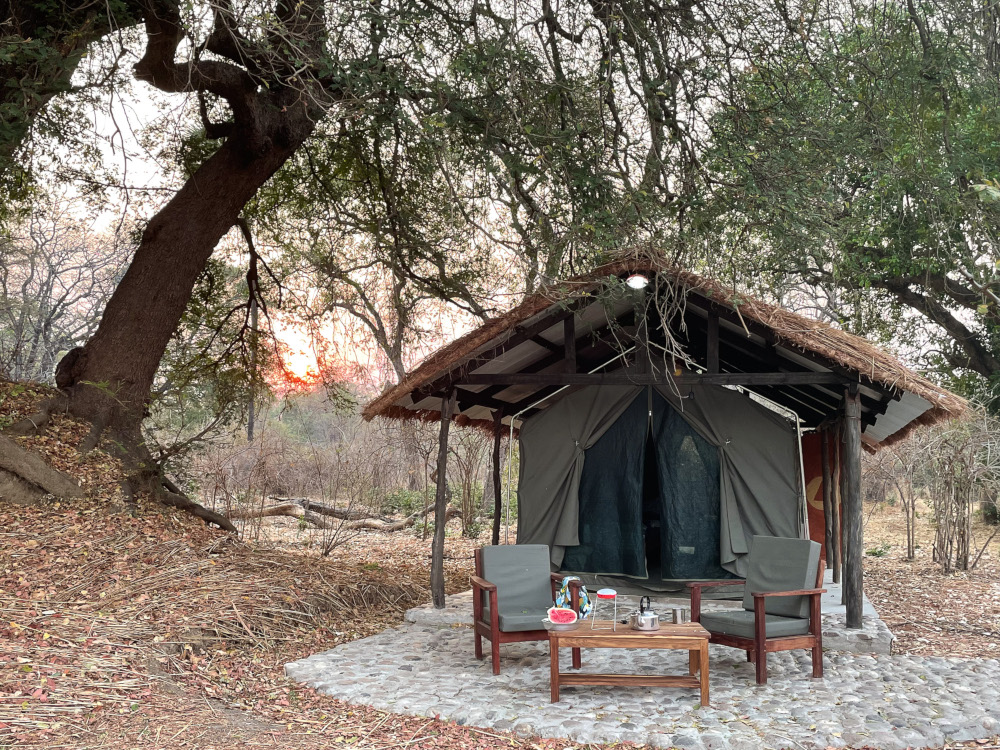
From Ituba Camp to Mano Gate
The direct road from Ituba to Mano Gate through North Luangwa National Park is about 70km. It was recently upgraded and shouldn’t take more than three hours. A more interesting option, once you are in the park, is to divert along the freshly cut Chimana Loop. However, this will almost double the driving distance and more than double the time required.
Whichever route you use, you must first head to the pontoon crossing point. Here you pay the park entrance fee for North Luangwa (US$25 per person per day for self-drivers, plus US$15 for the vehicle) then cross the river on a free hand-drawn pontoon. The location of the pontoon changes from time to time, depending on the water level. When we crossed, it was about 4km from Ituba Camp.
After the pontoon crossing, the road leads away from the river until you reach a junction. Here you can either go straight to continue directly to Mano Gate or turn right to get to the Chimana Loop.
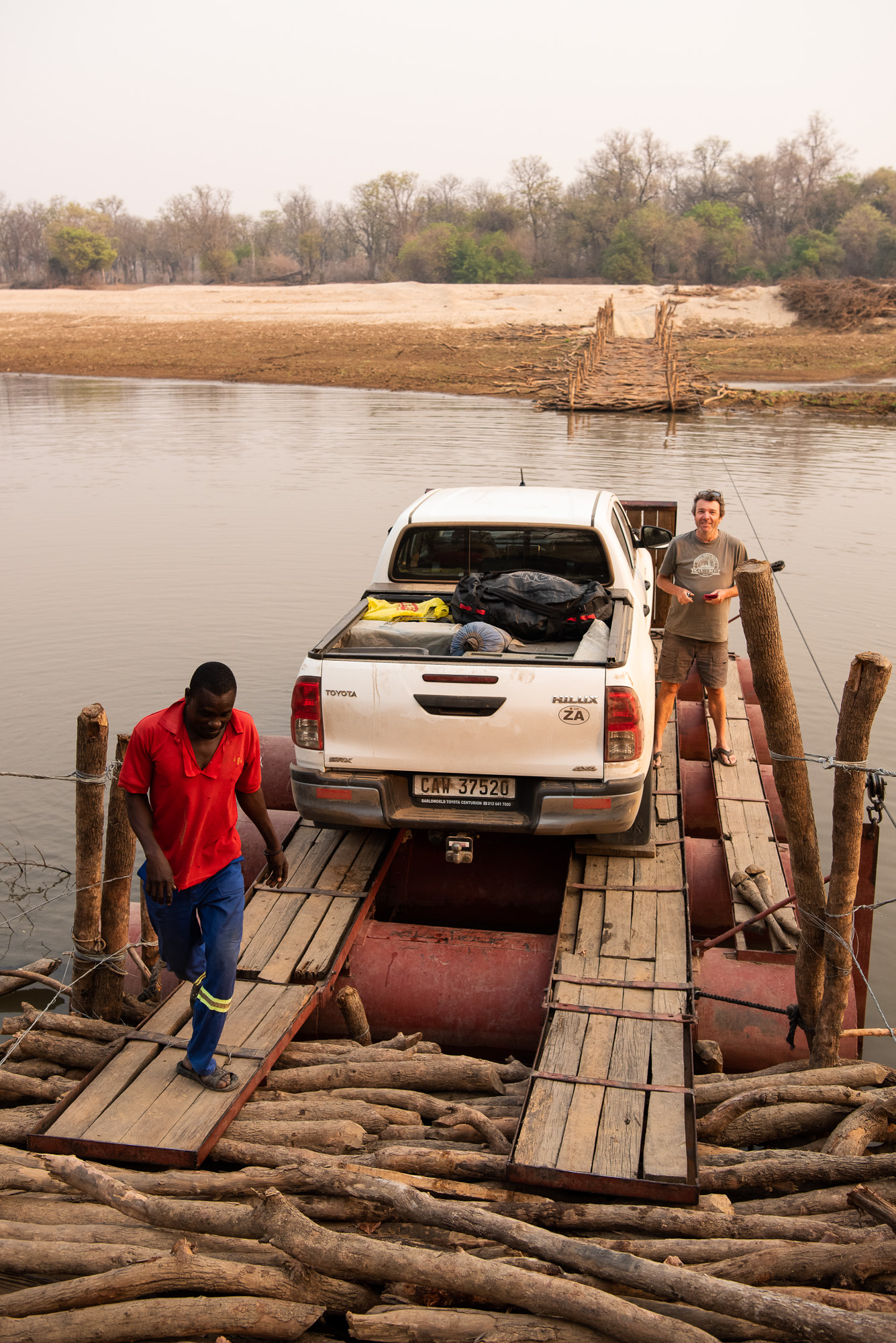
Game viewing along Chimana Loop
The loop follows the east bank of the Luangwa River in a broadly northeasterly direction to a seasonal tributary called the Chimana. Wildlife is quite scarce and skittish by comparison to South Luangwa, but we were pleasantly surprised at how much we did see. Puku, impala, greater kudu, waterbuck, warthog and baboon are all quite common. We also saw a mass of hyenas and vultures feeding on an elephant carcass. The unexpected highlight, however, was a very relaxed pack of 20 African wild dogs. We sat with the wild dogs for a good half-hour before they vanished into the bush. Elephants are present but should be treated with extreme caution, as they still seem to associate vehicles with poachers.
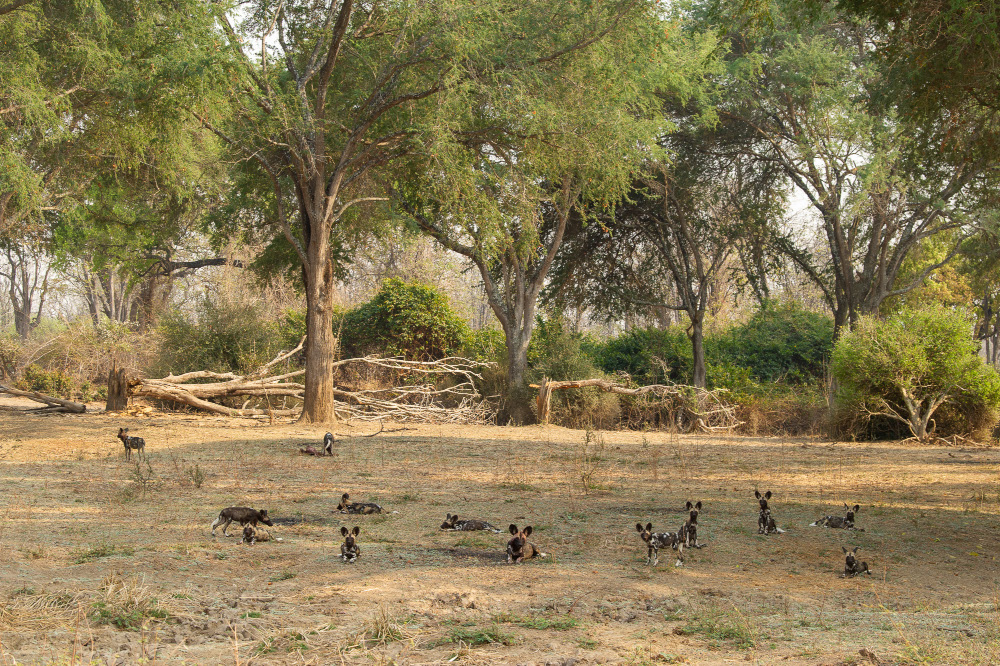
There are two interesting stops along the loop. The first, set on a forested bend in the river about 15km from the start, is a new FZS campsite with long-drop toilet and water pump. The second, about 10km further, is a beautiful lagoon that seems to attract plenty of wildlife including elephants. Shortly after reaching the Chimana River, the route joins an exceptionally straight firebreak-like service road. It runs southwest through some fairly unremarkable dry woodland where we saw little wildlife other than a herd of Cookson’s wildebeest (a Luangwa Valley endemic).
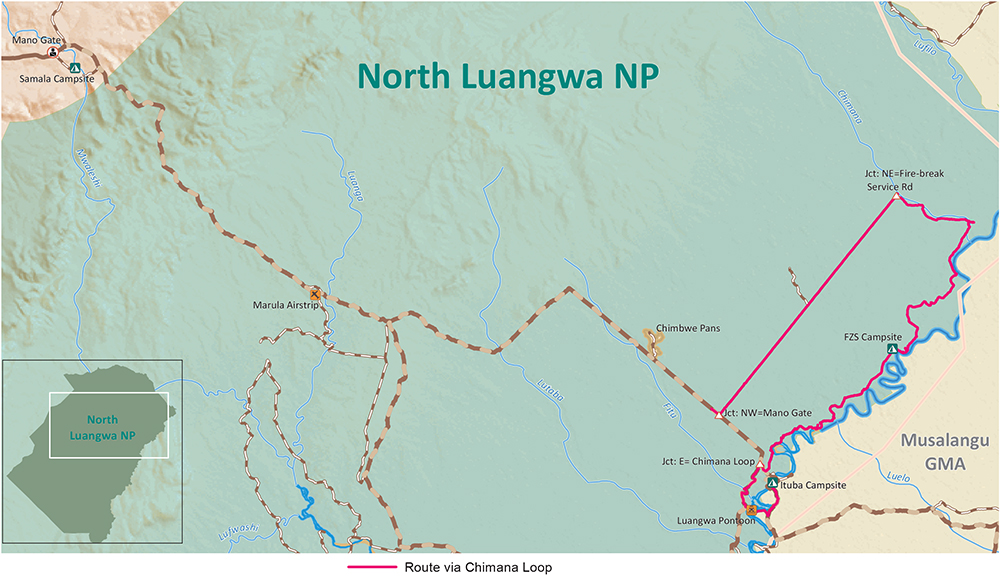
The Chimana Loop reconnects with the direct route to Mano Gate. From here, you ascend along the border of the park’s black rhino sanctuary. The route passes though some well-developed woodland as you gain altitude. We didn’t encounter much wildlife other than the occasional elephant, but birders should keep their eyes peeled. The unusual and very localised white-winged babbling starling is sometimes seen here.
Chilling out at Samala Camp
From Mano, it’s a straightforward two-hour drive to Mpika, but we strongly recommend a stopover at FZS’s Samala Camp. Just 5km outside the gate, this fabulous camp is perched on the escarpment at an altitude of 1,070m. The climate here comes as a literal breath of fresh air after the muggy Luangwa Valley. It stands alongside the Mwaleshi River, whose fast-flowing hippo- and crocodile-free waters are punctuated with rapids and natural swimming pools. The surrounding riparian and miombo woodland offers fabulous birding. Look out for the likes of giant kingfisher, African emerald cuckoo, purple-banded sunbird and localised miombo specialists such as bar-winged weaver.
Accommodation at Samala comprises three standing tents with twin beds, solar power and private outdoor showers and toilets. A well-equipped self-catering kitchen has a gas stove and a solar-powered fridge and freezer. There’s also a shaded riverside dining area with a braai place.
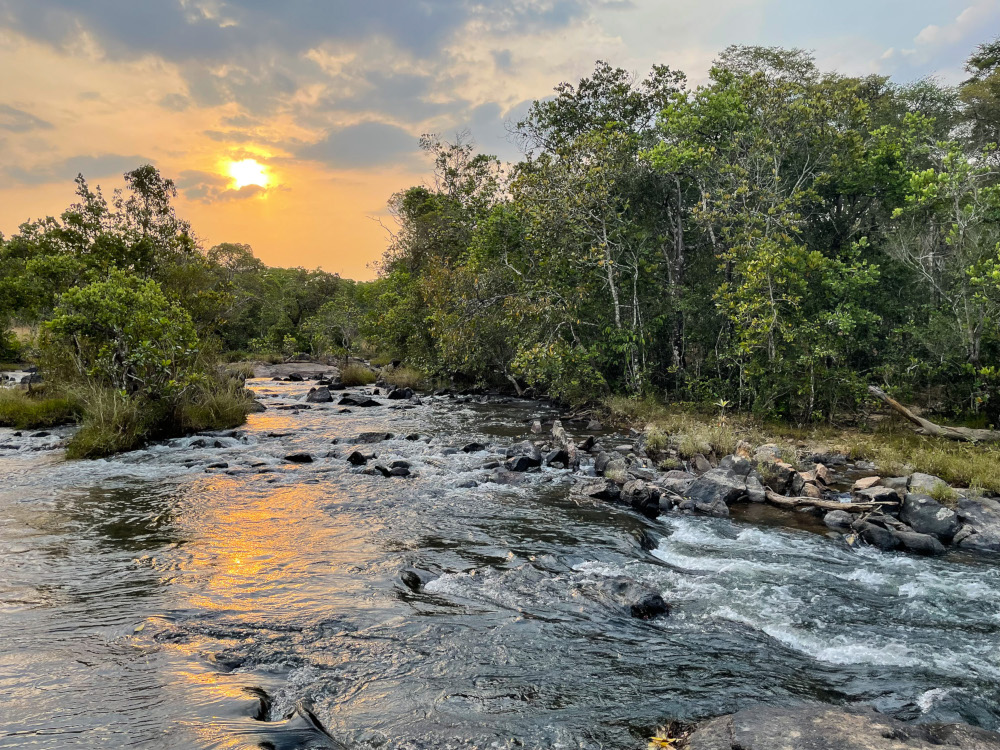
Good to know
The route via North Luangwa National Park is for the dry season only. It is likely impassable from December to April; some rivers might remain difficult to cross into May. Rates for Ituba Camp and Samala Camp are US$25 per person for an en-suite tent or US$10 to camp.
Bookings for both can be made by WhatsApp to +260 95 098 7579 (recommended) or via email to samala.camp@gmail.com or nlcp@northluangwa.org
Want to find your way around Zambia with ease? We’ve got you covered. The Tracks4Africa Zambia Paper Map is the most up-to-date printed map for overlanding. In addition to a vast network of minor gravel and off-road tracks, the map also covers game reserves. The Tracks4Africa Zambia Self-drive Guide offers more than 400 pages of objective travel information. The nine transit routes and four touring routes will take the stress out of trip pla
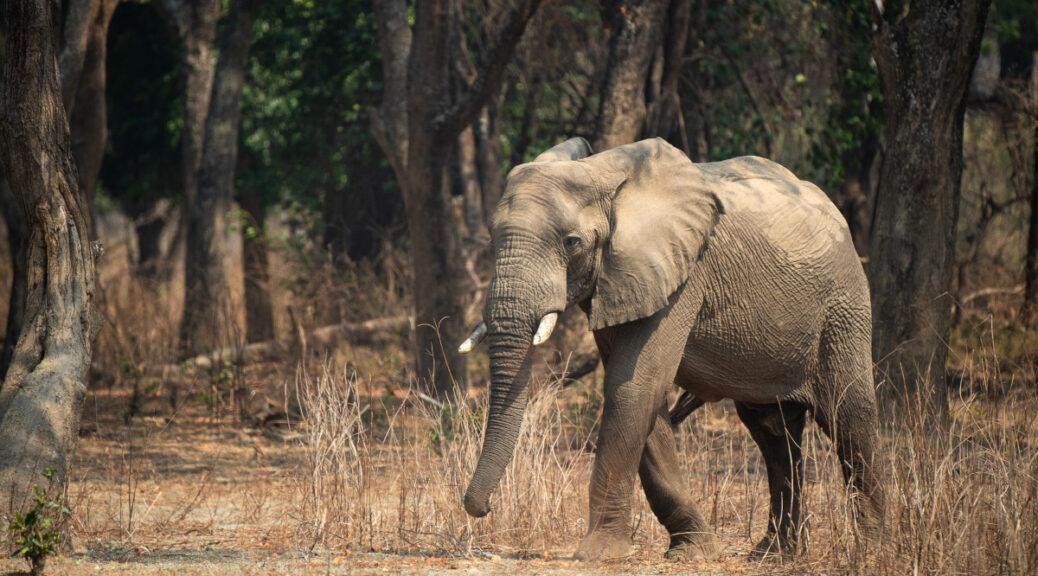

Hi
Thanks so much for the information. Can one drive from Chitembo towards Chama through North Luangwa without staying in the park and would the route be doable with a 2×4 Isuzu KB250?
Johann Groenewald of Tracks4Africa responds: The drive from Chitembo to Chama will necessitate a stop over in my opinion, if you aim to drive through the park. There are new camps on either end of the park. Samala in the north and Ituba in the south. These are just outside the park and brand new.
However, the river crossing at the pontoon in the south requires 4wd to get in and out of. The river is thick sand and the exit on a steep incline. The other sections could also easily turn into 4wd tracks if it rains.
Looks wondefull.Regarding the pontoon crossing point.We will be doing this June 2023 and tour with Iveco Daily 4×4.It weigha around 5.5t – 5 t.Will it be strong enough to hold this vehicle.Advise is appreciated
Hi Anton, my LC200 which probably weighs in at close to 3.5t felt a bit wonky on it already. Its not the kind of pontoon where the weight limit is indicated on a sign:-). I have reached out to one of our contacts and he also confirmed that 5.5ton is too much for the pontoon and the water level will be high that time of the year.
Thanks Johann,I expected that to be the case.Are there any other options to cross the river.
Hi Anton, no not that I am aware of. You would have to use Route05 into South Luangwa and cross with the steel bridge, but then you miss North Luangwa. Another option would be to do a loop via North Luangwa and return to the north and then come down to Route05.
A hidden gem on the same route you did not mention is North Luangwa River Lodge and Camp. A beautiful camp inside the park about 45 minutes from the chifunda pontoon set right on the banks of the Luangwa with a awesome view cold beers and soft drinks they offer camping and game drives night drives and walking safaris. They also have chalets. Self catering or full board.
A lovely place to stop and refresh. If you get tired of bush camps and after the long drive from Mfuwe it is a nice place to recharge reset and to have a beer on the deck and relax. luangwaexplorers.com
We are also planning our trip to Zambia for June 2022 & the Zambia Self-Drive Guide : Edition 1 has been invaluable in our planning. After reading the birding section of the book I was pouting as we are going in June but as Zambia is such a large country with sooooo much to explore we do plan to go more than once.
Just reading this is an experience inits self! I have recently purchased both the guide for Zambia and the paper maps. We are busy planning our trip of Zambia and am really happy to hear the upgrades to North Luangwa park!
Well done for the update and well done to the Frankfurt ZS!